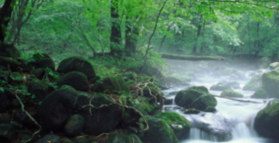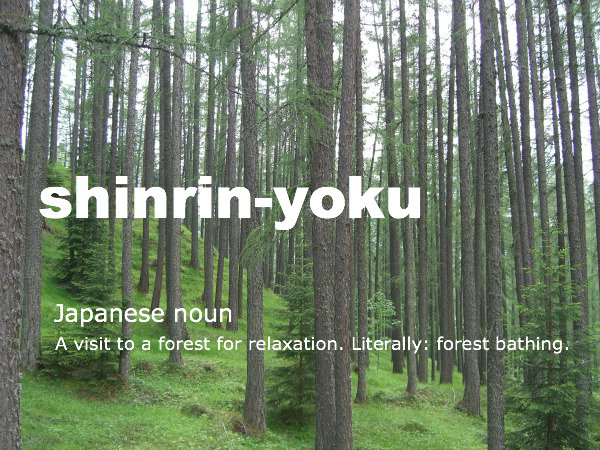 Benefits of Shinrin-yoku, or forest bathing
Benefits of Shinrin-yoku, or forest bathing
Posted on Tue, 14 Oct 14

Walking in a forest is deeply therapeutic, with scientific studies showing that so called forest bathing (Shinrin-yoku in Japanese) can transform your physiology and significantly enhance your mental and physical health.
The fresh air, beautiful scenery and tranquility of a forest is more than just pleasurable, Japanese researchers have been studying the health effects of Shinrin-yoku for a number of decades and have made some remarkable discoveries.
Forest bathing has been shown to:
- Significantly improve immune function
- Reduce levels of stress hormones such as cortisol, adrenaline and noradrenaline
- Reduce sympathetic nervous activity, increase parasympathetic nervous activity, and have a relaxing effect
- Reduce heart rate and blood pressure and enhanced heart function
- Improve work performance and reduced job stress
- Decrease feelings of anxiety, depression, fatigue, confusion and anger
- Increase feelings of mental vigor and feeling refreshed and revitalized

Japan is unique in that over 65% is forested and the health effects of Shinrin-yoku are well recognized with walking in forests a very popular recreational activity. However, even if you don't live in close proximity to a natural old growth forest you can also practice forest bathing by simply going on regular gentle walks in green parks, gardens, or wilderness areas while being mindful and appreciative of your surroundings.
References:
- Ikei H, Song C, Kagawa T, Miyazaki Y. Physiological and psychological effects of viewing forest landscapes in a seated position in one-day forest therapy experimental model. Nihon Eiseigaku Zasshi. 2014;69(2):104-10.
- Lee J, Park BJ, Tsunetsugu Y, et al. Effect of forest bathing on physiological and psychological responses in young Japanese male subjects. Public Health 2011, 125:93-100.
- Li Q, Morimoto K, Nakadai A, et al. Forest bathing enhances human natural killer activity and expression of anti-cancer proteins. Int J Immunopathol Pharmacol. 2007 Apr-Jun;20(2 Suppl 2):3-8.
- Li Q, Morimoto K, Kobayashi M, et al. A forest bathing trip increases human natural killer activity and expression of anti-cancer proteins in female subjects. J Biol Regul Homeost Agents. 2008 Jan-Mar;22(1):45-55.
- Li Q, Kobayashi M, Inagaki H, et al. A day trip to a forest park increases human natural killer activity and the expression of anti-cancer proteins in male subjects. J Biol Regul Homeost Agents. 2010 Apr-Jun;24(2):157-65.
- Li Q, Otsuka T, Kobayashi M, et al. Acute effects of walking in forest environments on cardiovascular and metabolic parameters. Eur J Appl Physiol. 2011 Nov;111(11):2845-53.
- Matsui N, Kagawa T, Miyazaki Y, Krensky AM. Visiting a forest, but not a city, increases human natural killer activity and expression of anti-cancer proteins. Int J Immunopathol Pharmacol. 2008 Jan-Mar;21(1):117-27.
- Ohtsuka Y, Yabunaka N, Takayama S. Shinrin-yoku (forest-air bathing and walking) effectively decreases blood glucose levels in diabetic patients. Int J Biometeorol. 1998;41:125–
- Park BJ, Tsunetsugu Y, Kasetani T, Hirano H, Kagawa T, Sato M, et al. Physiological effects of Shinrin-yoku (taking in the atmosphere of the forest): using salivary cortisol and cerebral activity as indicators. J Physiol Anthropol. 2007;26(2):123–8.
- Park BJ, Tsunetsugu Y, Kasetani T, Kagawa T, Miyazaki Y. The physiological effects of Shinrin-yoku (taking in the forest atmosphere or forest bathing): evidence from field experiments in 24 forests across Japan. Environ Health Prev Med. 2010 Jan;15(1):18-26.
- Park BJ, Tsunetsugu Y, Morikawa T, et al. Physiological and psychological effects of walking in stay-in forest therapy. Nihon Eiseigaku Zasshi. 2014;69(2):98-103.
- Ryan R.M., Weinstein N., Bernstein J., et al. Vitalizing effects of being outdoors and in nature. J. Environ. Psychol. 2010;30:159–168.
- Shin W.S. The influence of forest viewing through a window on job satisfaction and job stress. Scand. J. For. Res. 2007;22:248–253.
- Takayama N, Korpela K, Lee J, et al. Emotional, restorative and vitalizing effects of forest and urban environments at four sites in Japan. Int J Environ Res Public Health. 2014 Jul 15;11(7):7207-30.
- Tsunetsugu Y, Park BJ, Ishii H, et al. Physiological effects of Shinrin-yoku (taking in the atmosphere of the forest) in an old-growth broadleaf forest in Yamagata prefecture, Japan. J Physiol Anthropol. 2007, 26:135-142
Tags: Green Space, Nature, Forest Therapy, Shinrin-yoku, Earthing, Grounding




